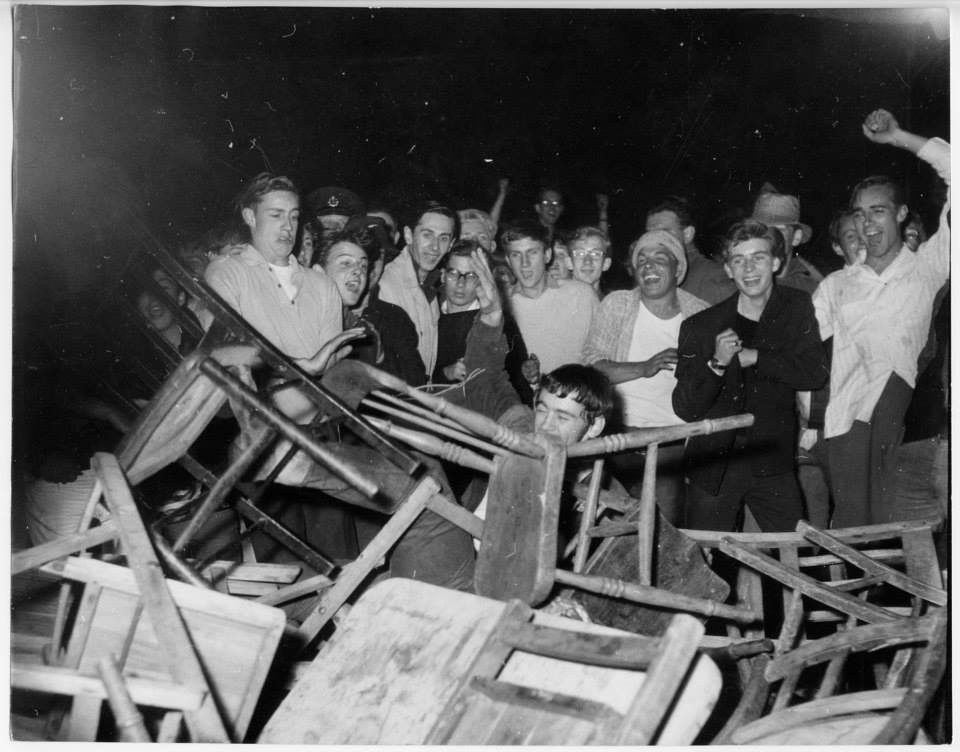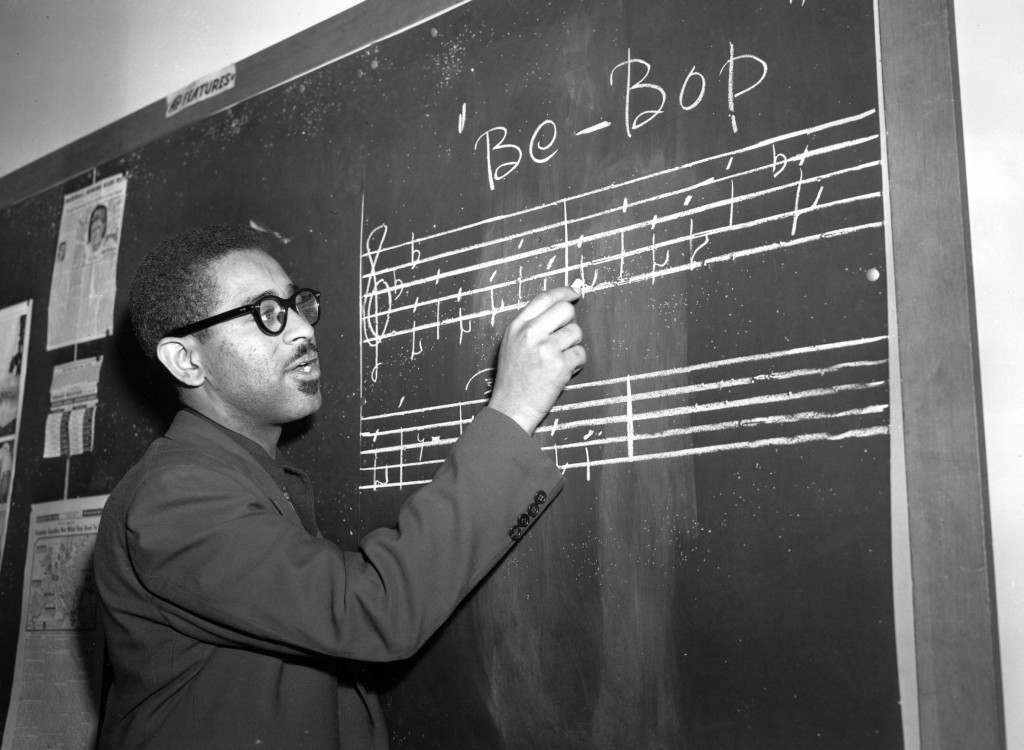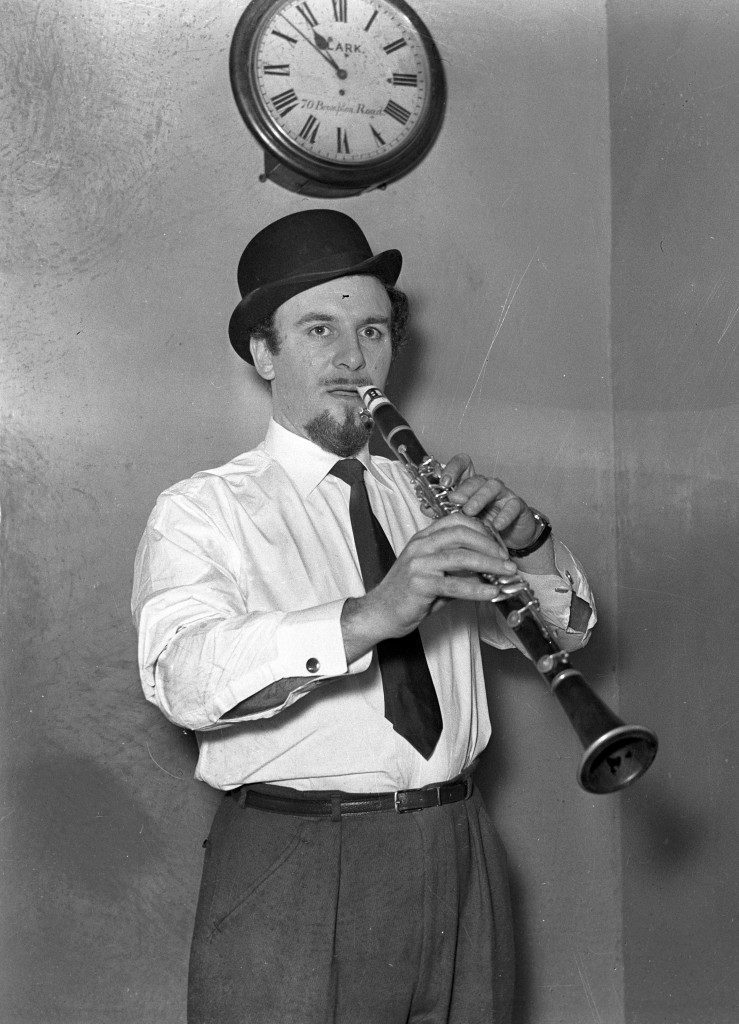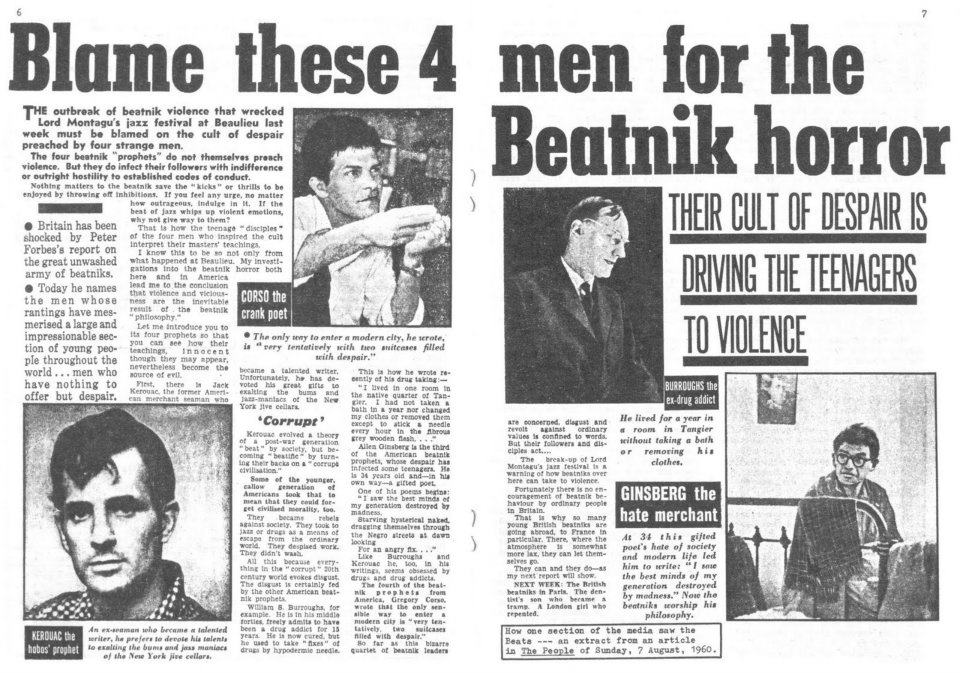ON July 30 1960, “things got out of hand” at the Beaulieu jazz festival. One of the UK’s earlier al fresco music festivals became The ‘Battle of Beaulieu’.
Ivan Hewett recalls:
Jazz at that time was a hotbed of competing styles, with deep antagonisms between different sets of fans. These were driven by class differences as much as musical tastes. The jazz historian Duncan Heinen has uncovered these simmering tensions in his fascinating history of jazz in the Sixties and Seventies, entitled Trad Dads, Dirty Boppers, and Free Fusioneers.
The book shows that the 1960 Beaulieu festival was really more a tail-piece to the Fifties, that edgy decade of beatniks, CND marches, Angry Young men, pop art, and race riots (it’s only because the Sixties have been so mythologised that people automatically think of the Fifites as drab). Jazz was in the thick of it, though witnesses of the period never seem to agree whether a fondness for drainpipe trousers meant you were anti-nuclear power and for modern jazz, or despised Dizzy Gillespie and preferred skiffle.
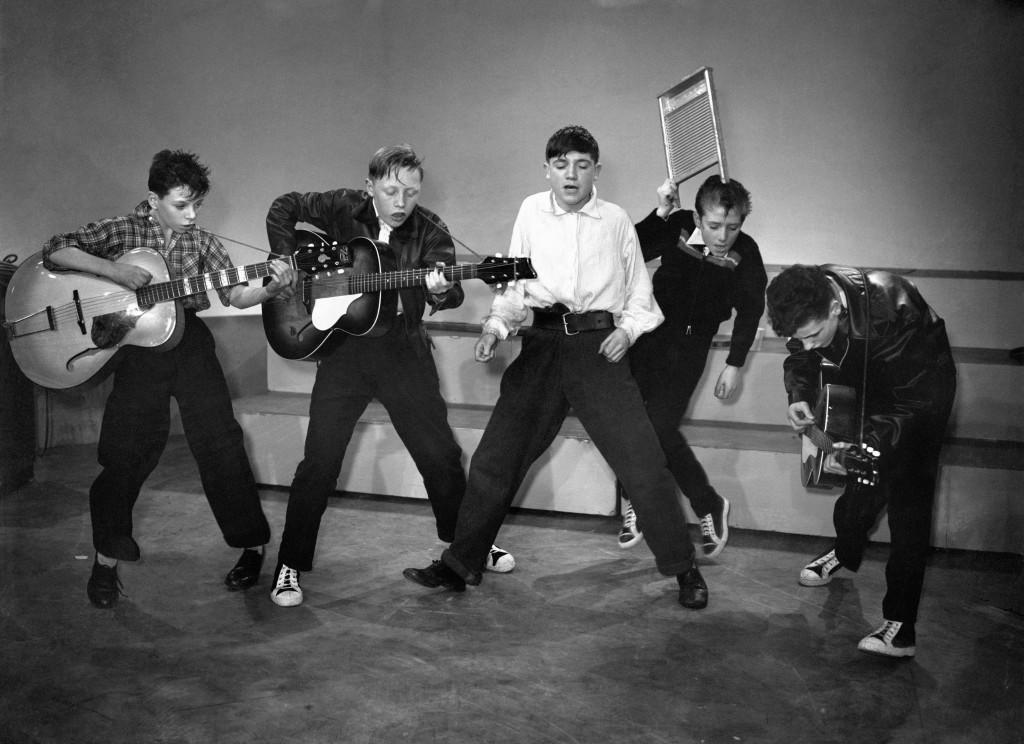
The McCormick Skiffle Group, from left to right, Billy McCormick, Frank Healy, Wesley McCausland, Edward McSherry, and James McCartney.
Ref #: PA.6397931. Date: 02/11/1957
Some say it was a working class thing to like modern jazz, and that middle-class rebelliousness came out in ‘jiving’ to trad. One indubitable fact is that the rock and roll, R&B and jazz scenes were closely interlinked, and players such as Ginger Baker could migrate from one to another. Look closely at this film clip of the 3rd Beaulieu jazz festival and you’ll catch a glimpse of a very young Rod “the Mod” Stewart among the eager crowds...
Rod would recall:
At 16, I went to the Beaulieu Jazz Festival in the New Forest. I’d snuck in with some mates via an overflow sewage pipe. And there on a secluded patch of grass, I lost my not-remotely-prized virginity with an older (and larger) woman who’d come on to me very strongly in the beer tent. How much older, I can’t tell you — but old enough to be highly disappointed by the brevity of the experience.
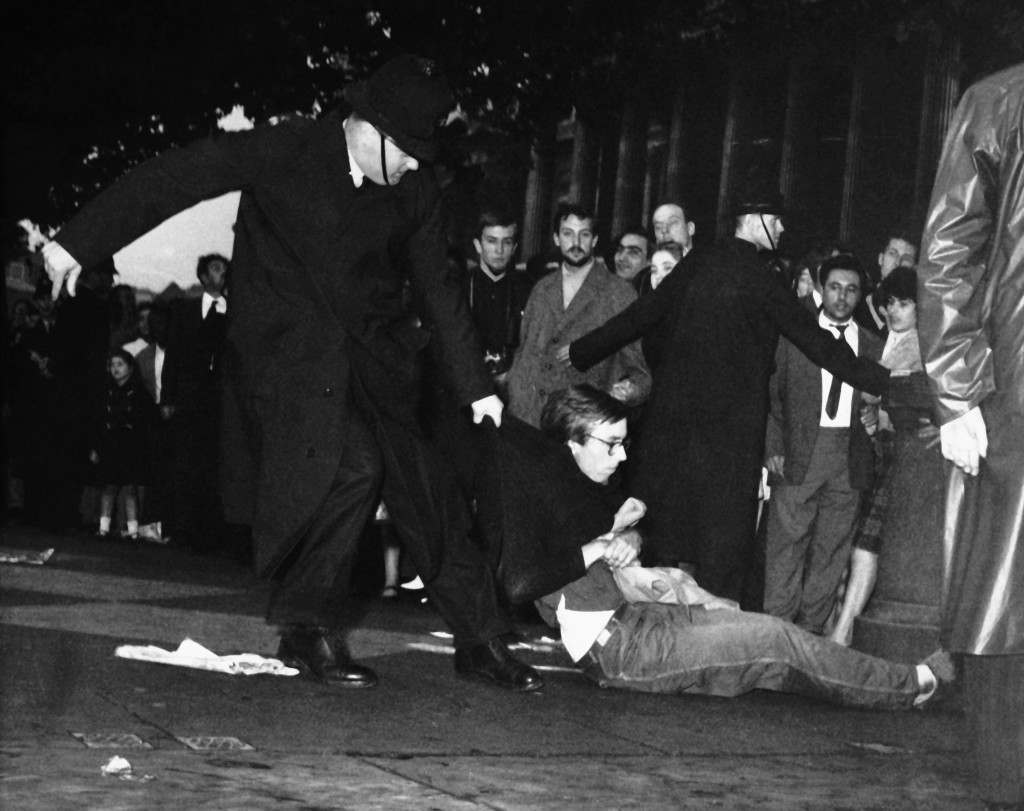
A young man in Beatnik style clothes is dragged along by a policeman a another holds back a section of the crowd during the ban he home rally in LondonÂs Trafalgar Square, United Kingdom on Sept. 17, 1961. Extra police were on duty on handle the huge crowd, estimated at over 10,000 which gathered in the square. Several skirmishes took place and at 6.15 pm 86 people had been arrested. (AP Photo)
Ref #: PA.8792989
Finding out what really happened that day at Beaulieu is like asking what really happened at the riotous premiere of the Rite of Spring. Some say it was the bearded trad fans versus the modern jazzers. Other say it was nothing to do with music at all. One witness insists it was Teddy Boys shouting “We want Acker!” (meaning trad jazz clarinettist and singer Acker Bilk), while the correspondent for Melody Maker sniffed about working-class “mobsters” coming from Portsmouth and Southampton. Once the stage had been invaded, chaos quickly ensued. A building was set on fire, 39 people were injured, and the BBC pulled its outside broadcast feed off the air six minutes early. “Things are getting quite out of hand,” said the announcer primly.
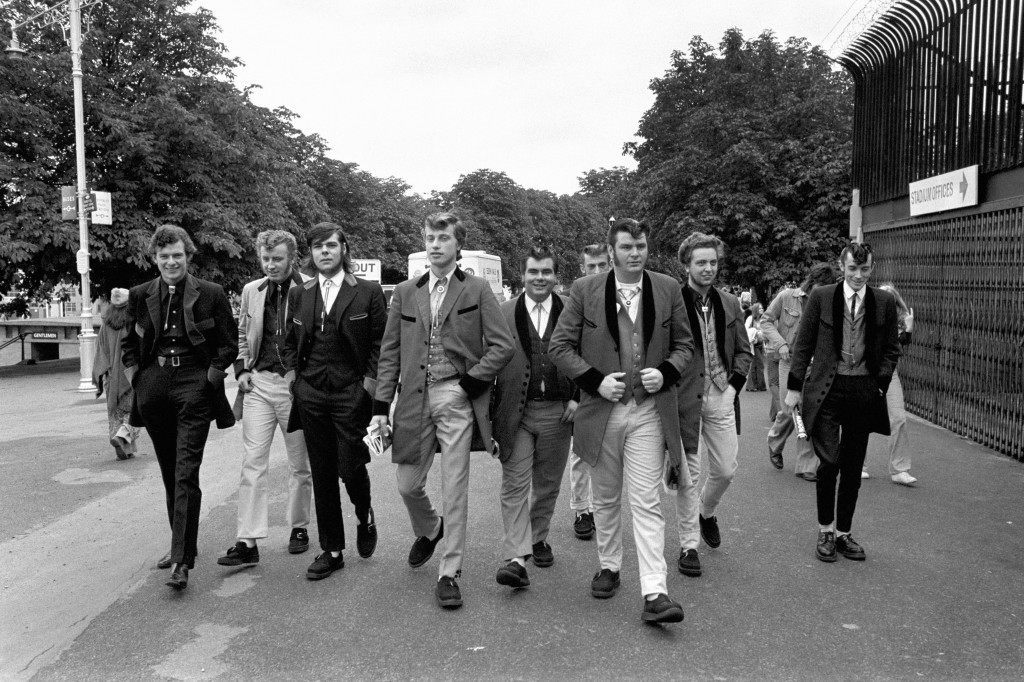
Teddy-boys arrive for the Rock revival festival wearing long jackets, drainpipe trousers and string ties.
Ref #: PA.4945663. Date: 05/08/1972
Bilk had seen it coming:
Clarinettist Acker Bilk, whose trad band played for over an hour to pacify the protesters, later said: ‘They were phoney imitation beatniks. Real ones may be weird, untidy and excitable but they’re not hooligans.’ Bilk had in fact enjoyed a taste of what might happen when he had played Victoria Park in Hackney two months earlier. ‘It was uglier than Beaulieu, but police with dogs broke it up,’ he said.
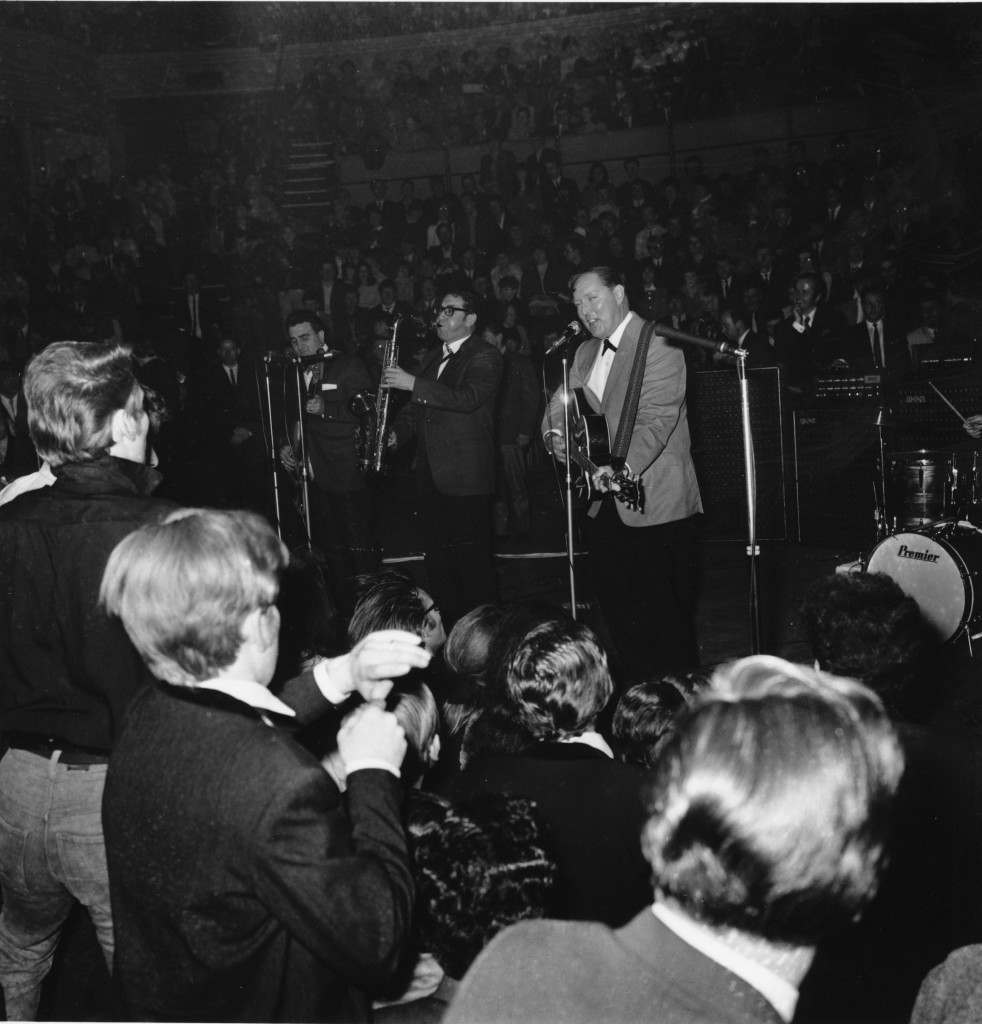
American rock-and-roll entertainer Bill Haley is seen performing with his group
Ref #: PA.8695790. Date: 01/05/1968
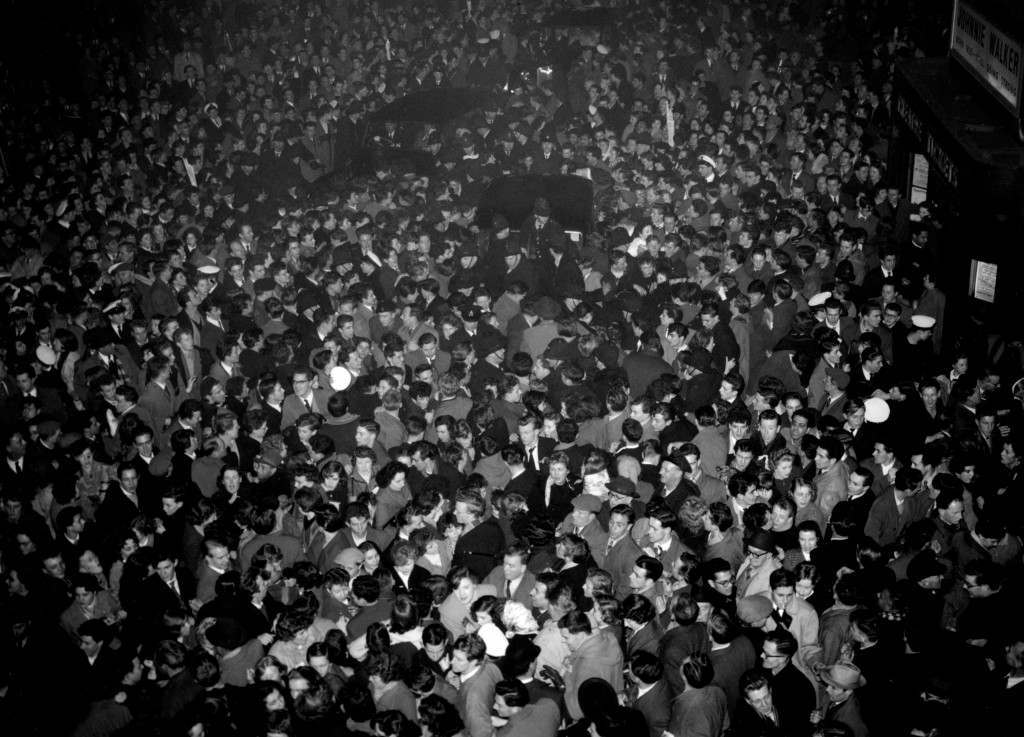
Crowds gather outside the Dominion Theatre in Tottenham Court Road, London, where Bill Haley & His Comets are playing.
Ref #: PA.20472038. Date: 06/02/1957
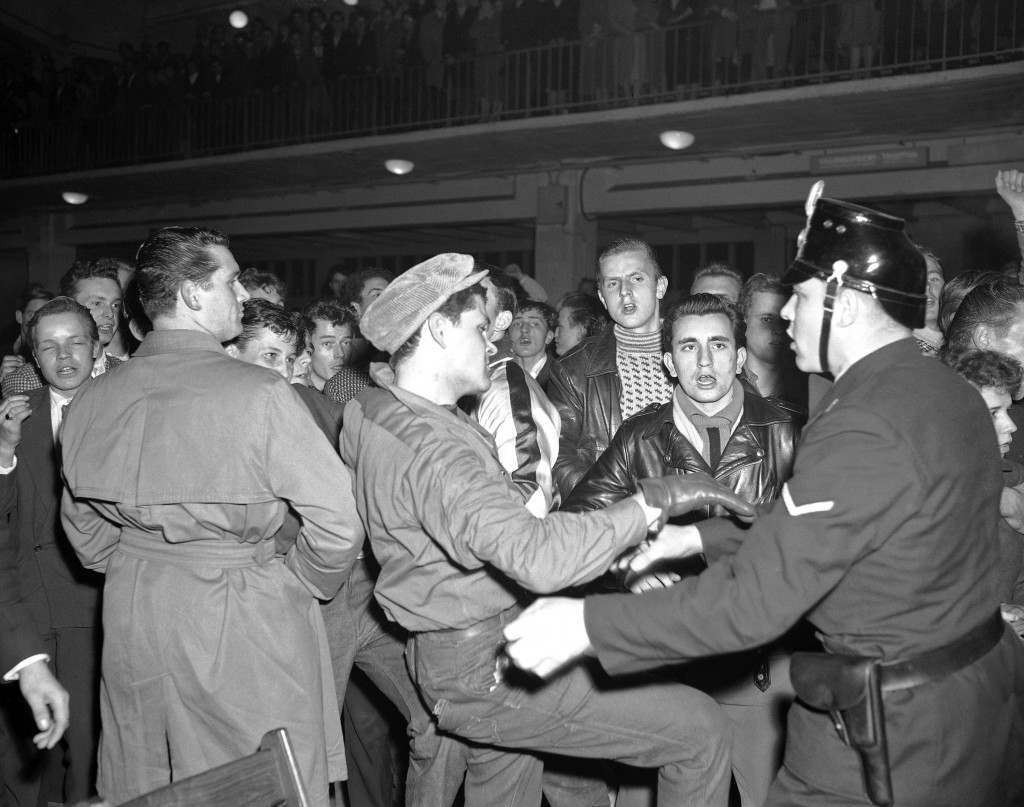
One of the seat-smashing youngsters who scared American rock Ân roll singer Bill Haley off the stage during his performance in the Hamburg, West Germany, Ernst-Merck-Hall on Oct. 27, 1958. In a wild fist-and-stick battle numerous troublemakers were arrested by police when clearing the sold-out Ernst-Merck-Hall. Several policemen were injured. (AP Photo/Henry Brueggemann)
Ref #: PA.10572634
In Trad jazz in 1950s Britain—protest, pleasure, politics, George McKay preludes the aggro:
After the initial postwar austerity, the 1950s displayed an increasingly confident and vibrant (sometimes violent) range of youth and anti-establishment cultures: coffee bars, Teddy Boys, skiffle, beatniks, Angry Young Men, satire, pop art, left-wing journals, Caribbean culture, CND marches, and so on. These were frequently though not exclusively inspired by the energy of imported American pop culture. In 1955 and 1956, London cinemas were trashed by rioting Teds inflamed by scenes of the curious figure of Bill Haley with his band the Comets, in the American films The Blackboard Jungle and Rock Around the Clock. By 1958 some Teds would be transferring their riotous attentions to London’s migrant black community, in the ‘race riots’ of the late 1950s…
The Observer newspaper reported:
First-aid men and firemen were called out; at one time 20 ambulances and five fire engines were in the grounds of Lord Montagu’s home, Palace House. At least two boys were arrested. The piano collapsed when fans climbed on to the platform. Mr Acker Bilk’s band were playing at the time.
Earlier, everything seemed set fair for a rousing evening – “I’ve never seen a thousand chairs fill so quickly,” was Lord Montagu’s joyful reaction to the opening of the festival. He had not, at that stage, looked at the queue outside.
With the lawn in front of Palace House packed solidly with unkempt humanity there was still a straggling line some 600 yards long in the driveway waiting for admission.
The reaction of the population of the New Forest to this mass influx was less enthusiastic. The coffee-house cult has reached no farther than Southampton – across the water and half a world away to judge by the mutterings of the pub smoking-room as a mob of beats roamed by…
“I wouldn’t mind so much,” confided one outraged hotelkeeper, “if they washed now and then.” Certainly one could see his point as the jazz fans turned up in their standard uniform of rumpled jeans and T-shirts, sandals and haircuts that must have wrung the hearts of the two former Irish Guards sergeants who were running the campsite behind the car park.
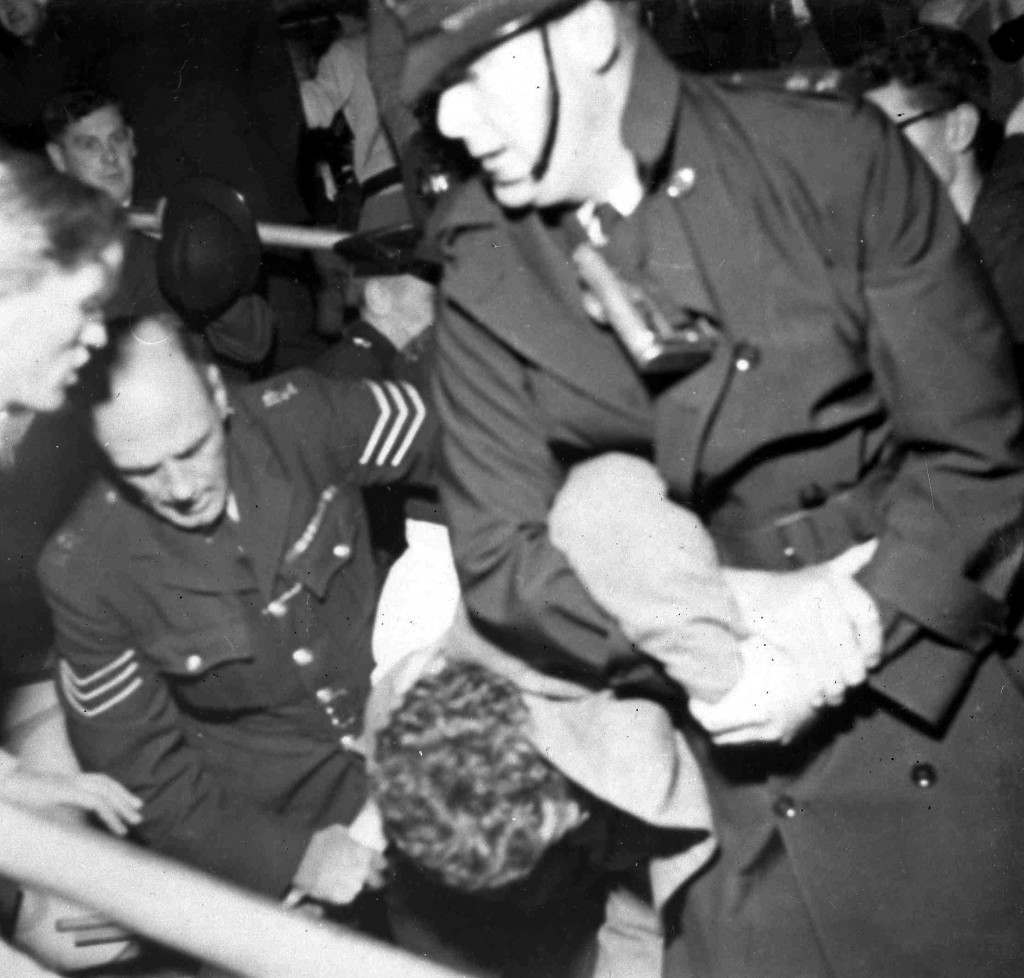
Police struggle with a youth in the grounds of Beaulieu Palace, Hampshire, July 30, 1960, after the Beaulieu Jazz Festival had turned into a riot. Youths and police fought in the grounds for several hours. (AP Photo) – Ref #: PA.6138446
Monkey Picks look show The People reported the mayhem:
If I were a young man on 7th August 1960 and not already a jazz loving beatnik, the Sunday paper The People would’ve had me scurrying to Dobell’s record shop for Mingus Ah Um and searching backstreet bookshops for an under-the-counter copy of The Naked Lunch quicker than one could say “Straight from the fridge, Dad”.
“Blame these 4 men for the Beatnik horror” exclaimed Peter Forbes, as shocked Britain learnt how a great unwashed army of beatniks had been driven to violence by a group of American writers and poets, culminating in a riot at the Beaulieu Jazz Festival. Exciting stuff.
Organised by Lord Montagu and held on the lawns of his Palace House in the New Forest, the Beaulieu Jazz Festival was in its fifth year when it achieved notoriety due to the behaviour of fans from both ends of the jazz spectrum: the traditionalists rooted in sounds of 1920’s Dixieland and the modernists building on a bebop template. According to photographer David Redfern both sides complained not enough of “their” type of jazz was being performed before things came to a head when increasingly drunk youths pulled down lighting rigs, set fire to a building and destroyed the stage. The BBC, broadcasting the event live on television, abruptly ended their coverage ahead of schedule with a typically understated comment, “Things are getting quite out of hand”.
The People told its readers, “The outbreak of violence that wrecked Lord Montagu’s jazz festival at Beaulieu last week must be blamed on the cult of despair preached by four strange men”. Those four strange men identified like names on a wanted poster as Jack “The Hobos’ Prophet” Kerouac; Allen “The Hate Merchant” Ginsberg; William “The Ex-Drug Addict” Burroughs and Gregory “The Crank Poet” Corso.
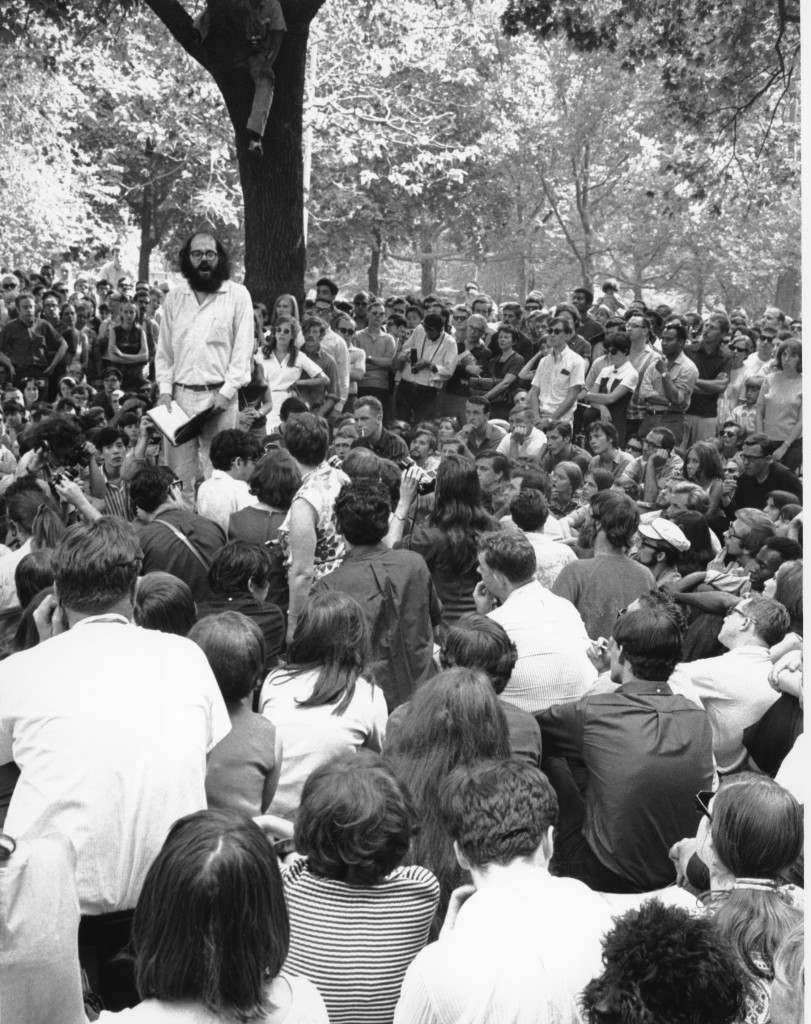
A crowd listens to Allen Ginsberg give a reading of uncensored poetry at New York City’s Washington Square park on Aug. 28, 1966. The bearded poet joined others in giving the reading in order to test a New York Supreme court decision permitting poets to give uncensored readings in public parks. (AP Photo)
Ref #: PA.8629486
“These four beatnik “prophets” do not themselves preach violence. But they do infect their followers with indifference or outright hostility to established codes of conduct. Nothing matters to the beatnik save the “kicks” or thrills to be enjoyed by throwing off inhibitions. If you feel any urge, no matter how outrageous, indulge in it. If the beat of jazz whips up violent emotions, why not give way to them?”
That was the strength of the Beat Generation Quartet’s link to Beaulieu but it gave the paper enough to feed into the moral panic surrounding the nation’s latest youth menace and expand upon their exposé from a fortnight earlier; a double-page spread “The Beatnik Horror” that warned how thousands of young Americans hooked on this beat craze became “drug addicts and peddlers, degenerates who specialize in obscene orgies… and outright thugs and hoodlums”.
To illustrate how this cult was manifesting itself on Britain’s streets they visited Gambier Terrace in Liverpool to show a group of residents sitting in “unbelievable squalor” with their friend who’d dropped by to “listen to some jazz”. The property shown was shared at the time by John Lennon and Stuart Sutcliffe, and the bearded chap in the photo was Allan Williams, owner of local coffee bar The Jacaranda and manager of the then Silver Beatles, just about to head to Hamburg for the first time.
On the same bank holiday weekend as Beaulieu (held in those days on the first Monday in August), Alan Whicker reported for the BBC’s Tonight programme. Councillors in Newquay had written to all shopkeepers, café owners and bar managers urging them not to serve beatniks visiting the Cornish town over the summer and for restaurateurs and hoteliers to refuse them jobs as washer-uppers. Their hair and beards were just about tolerated but their stink was more than the council could stand. “A man owes it to society to keep himself clean,” according to one pub landlord. Such claims were refuted by local long-hair Eric who told Whicker he washed at least every two days.
And what of the host, the esteemed Lord Montague?
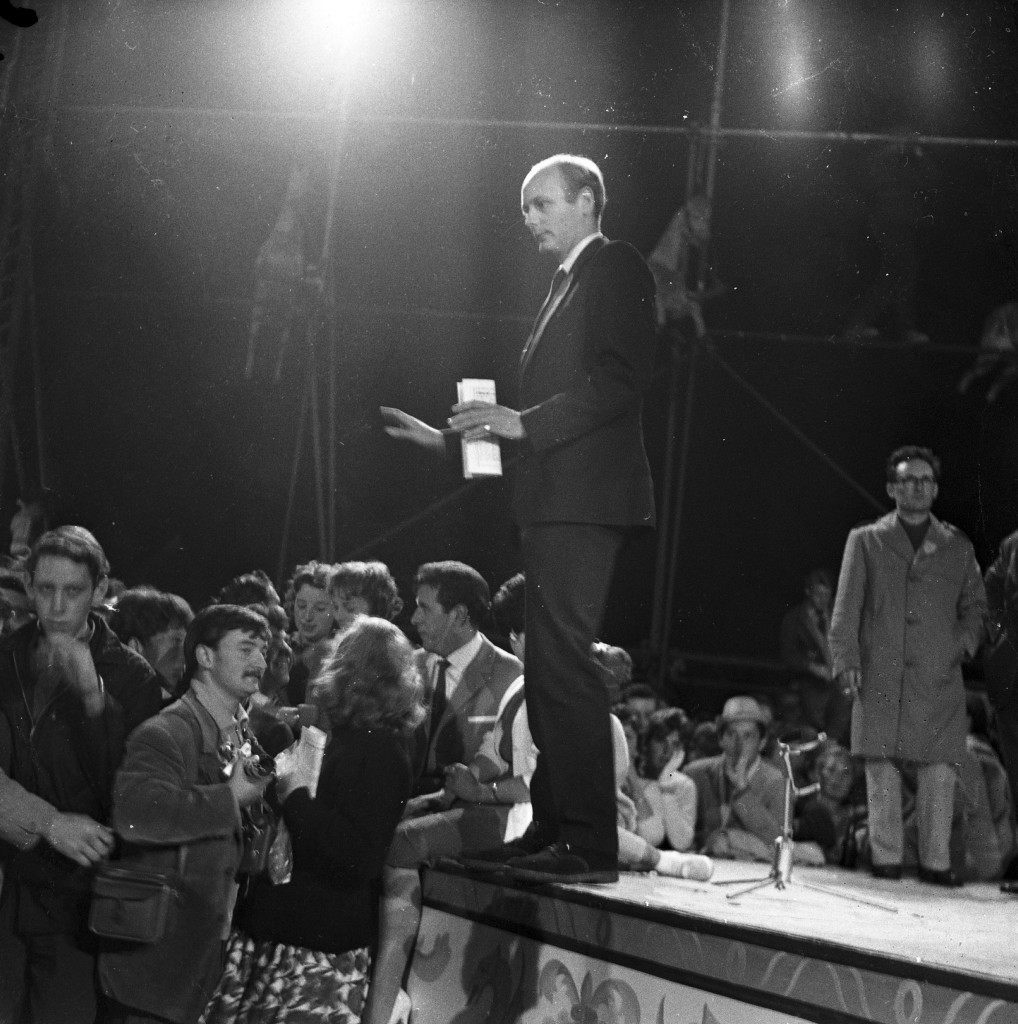
Lord Montagu calls for calm as hundreds of teenagers riot at a jazz festival held at Beaulieu Palace, Beaulieu, July 30, 1960. Broadcastin rigging was wrecked and an outbuilding was set on fire during the riots in which 39 people were injured. Ref #: PA.2528499
He told the Daily Mail in 2007:
‘I’ve never spoken about it before,’ he says, wiping at filmy eyes with a large white handkerchief. He takes a deep breath. ‘It’s difficult to bring it all back. One does find it very hard to talk about. I feel very emotional about it.’ It is, perhaps, unsurprising that the trial’s impact should still be felt so keenly. The Montagu case of 1954 was a cause celebre that horrifed the Establishment and changed the course of British history. Lord Montagu, then a 28-year-old socialite and the youngest peer in the House of Lords, was one of three men convicted of ‘consensual homosexual offences’. But the prosecution provoked a wave of sympathy from the Press and the public, many of whom felt it amounted to little more than an unedifying witch-hunt.
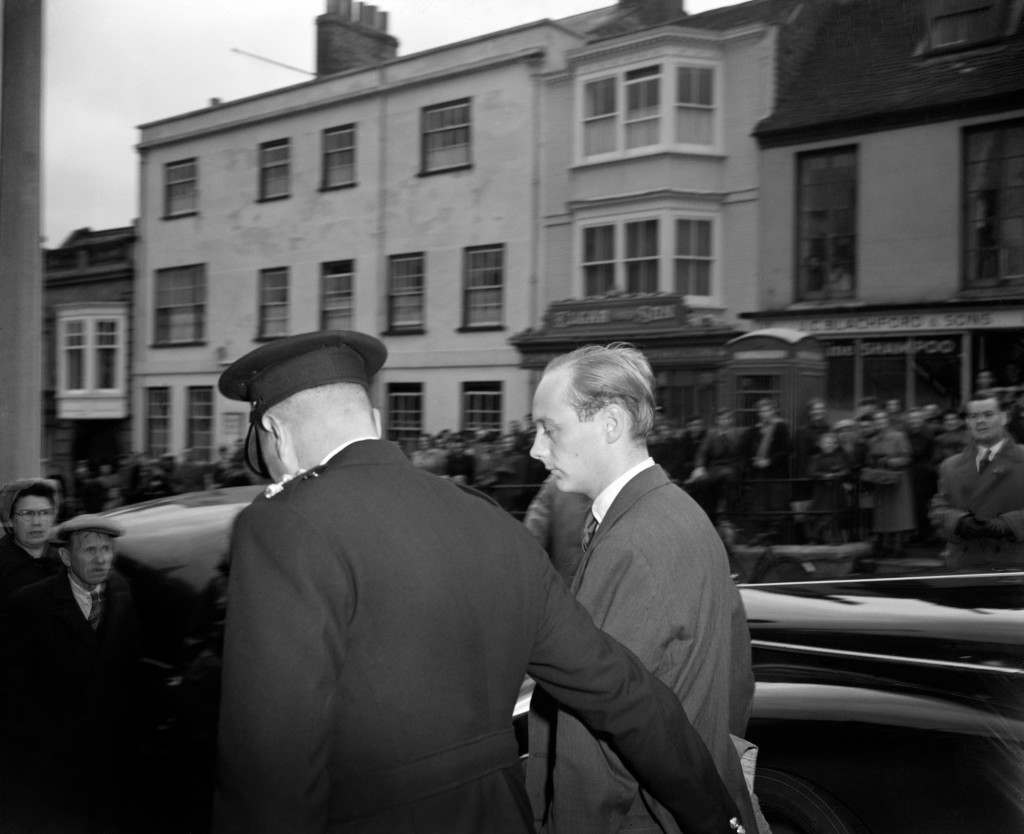
Chief Inspector L.C Orchard leads Lord Montagu into Lymington Town Hall Court. He is charged with “conspiracy to incite certain male persons to commit serious offences with male persons”. Lord Montagu, former director of a London publicity firm, had returned to England only a few hours earlier from France.
Ref #: PA.12517618
Date: 08/11/1953
On March 24,1954, the then 27-year-old Montagu, dubbed “the Empire’s most eligible bachelor,” a member of the House of Lords and one of Princess Margaret’s escorts, stood before a judge at Hampshire Assizes in Winchester. He had been arrested four months earlier at Heathrow airport as he returned from visiting his sister in Texas. An all male jury listened to charges that Montagu and two co-defendants had “incited” two Royal Air Force enlisted men to “commit unnatural and indecent acts” at a party at Montagu’s beach house. As his mother, Alice, watched, Montagu swayed only slightly as the guilty verdict was announced. “I am dealing with you in the most lenient way I possibly can,” the judge told Montagu as he sentenced him to a year in jail.
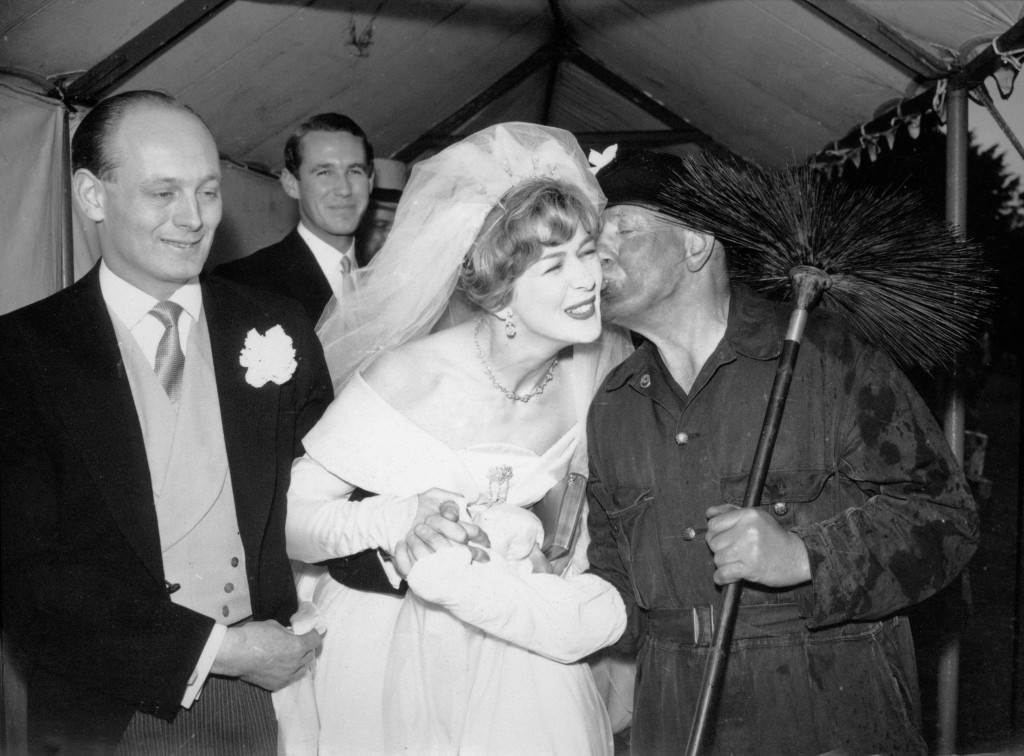
Lord Montagu watches with a smile as his bride, the former Miss Belinda Crossley, gets a good-luck kiss from chimney sweep Frank Miles as she leaves the 13th century Abbey Church at Beaulieu, Hampshire, after their wedding.
Ref #: PA.12527525
Date: 11/04/1959
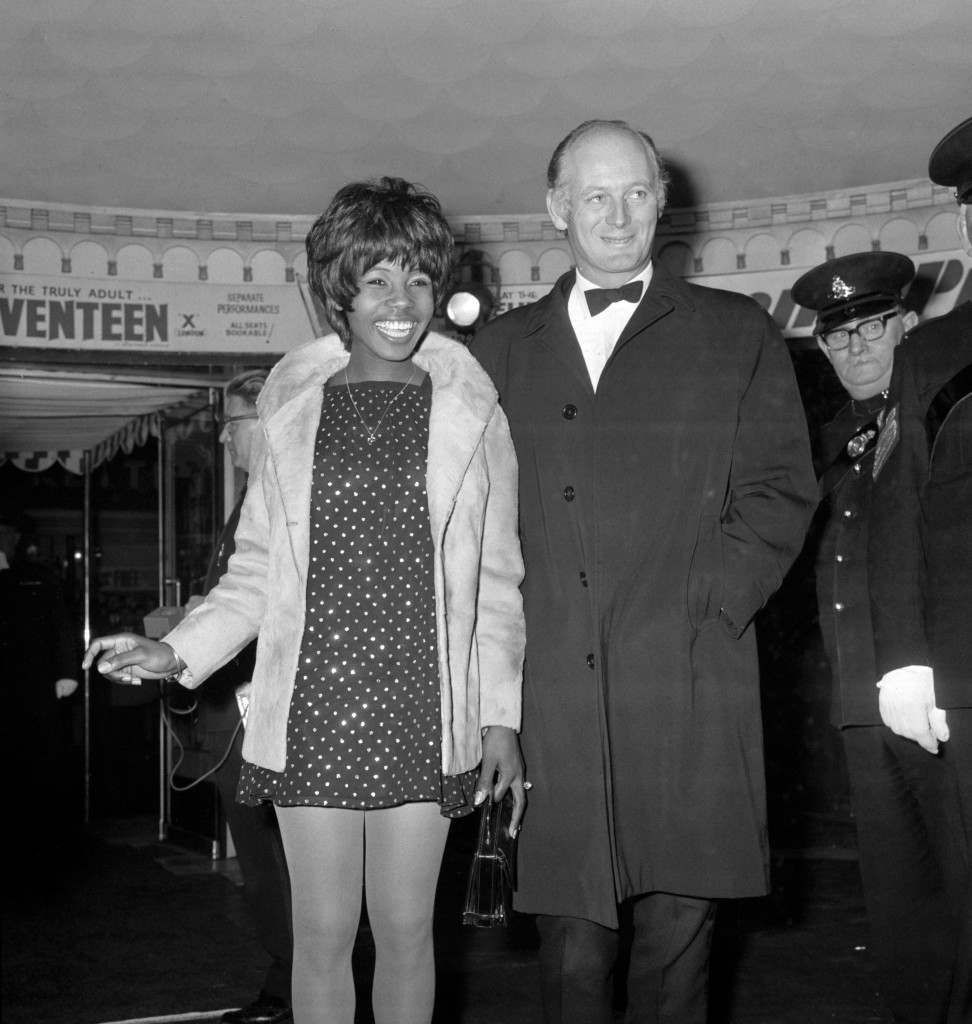
Lord Montagu of Beaulieu arriving with pop singer Millie at the Casino Cinerama Theatre, Old Compton Street, London, for the world premiere of “Custer of the West”
Ref #: PA.12520179
Date: 09/11/1967
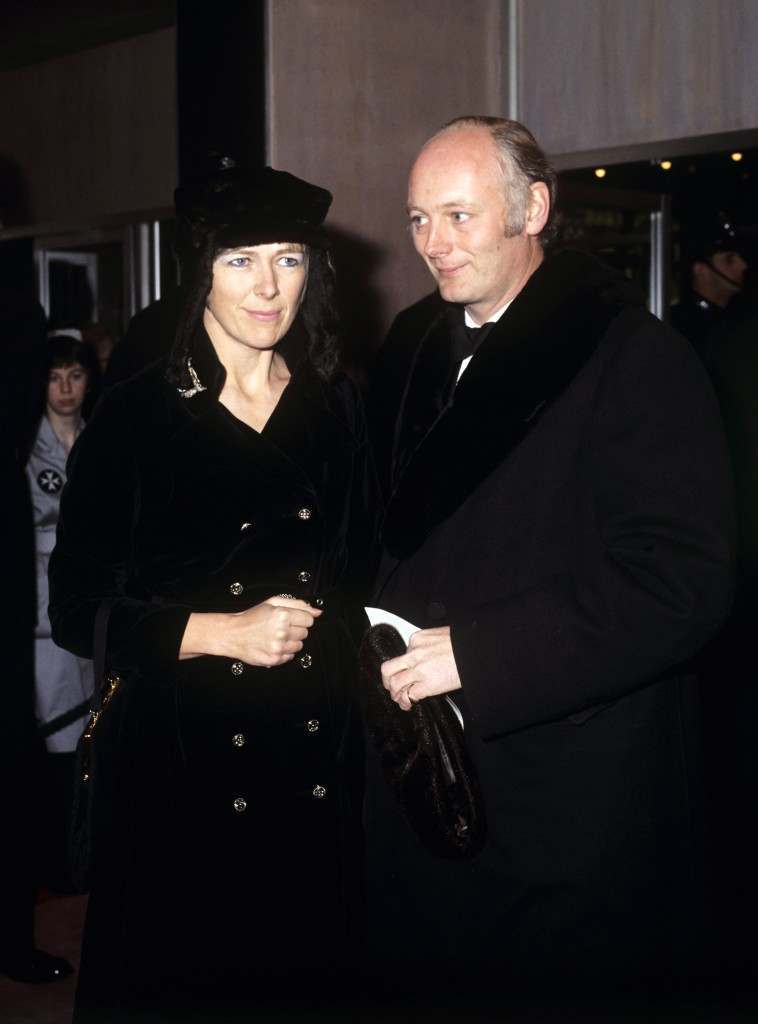
Lord and Lady Montagu of Beaulieu attend the Royal World Charity Premiere of Chitty Chitty Bang Bang at the Odeon, Leicester Square, London.
Ref #: PA.12641980
Date: 16/12/1968
The fall-out from the Montagu trial had a direct influence on the British legal system and, in 1957, a government committee recommended that homosexual acts between consenting adults in private be legalised. The proposals were made law in 1967.
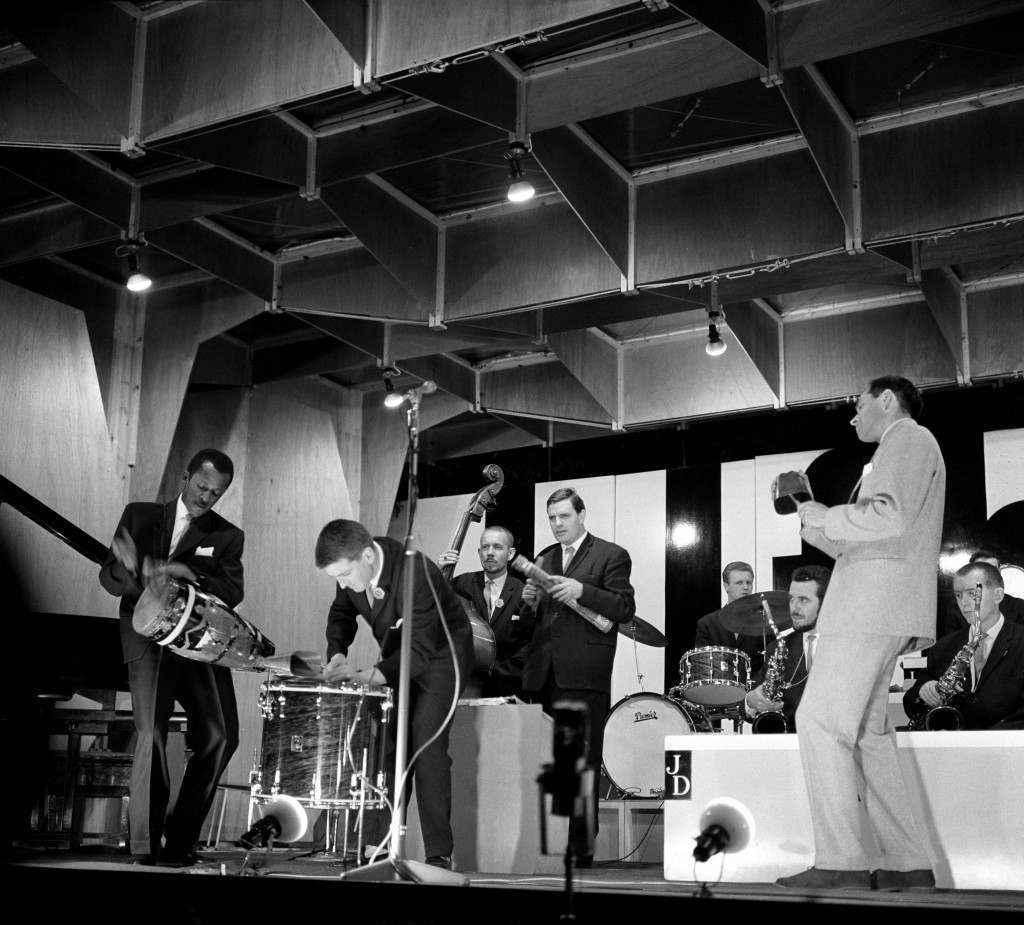
Johnny Dankworth and his orchestra play during the Jazz Festival held in the grounds of Lord Montagu’s home, Palace House at Beaulieu, Hampshire
Ref #: PA.8331441
Date: 30/07/1961
The following year Lord Montagu tried again:
Would you like to support Flashbak?
Please consider making a donation to our site. We don't want to rely on ads to bring you the best of visual culture. You can also support us by signing up to our Mailing List. And you can also follow us on Facebook, Instagram and Twitter. For great art and culture delivered to your door, visit our shop.
